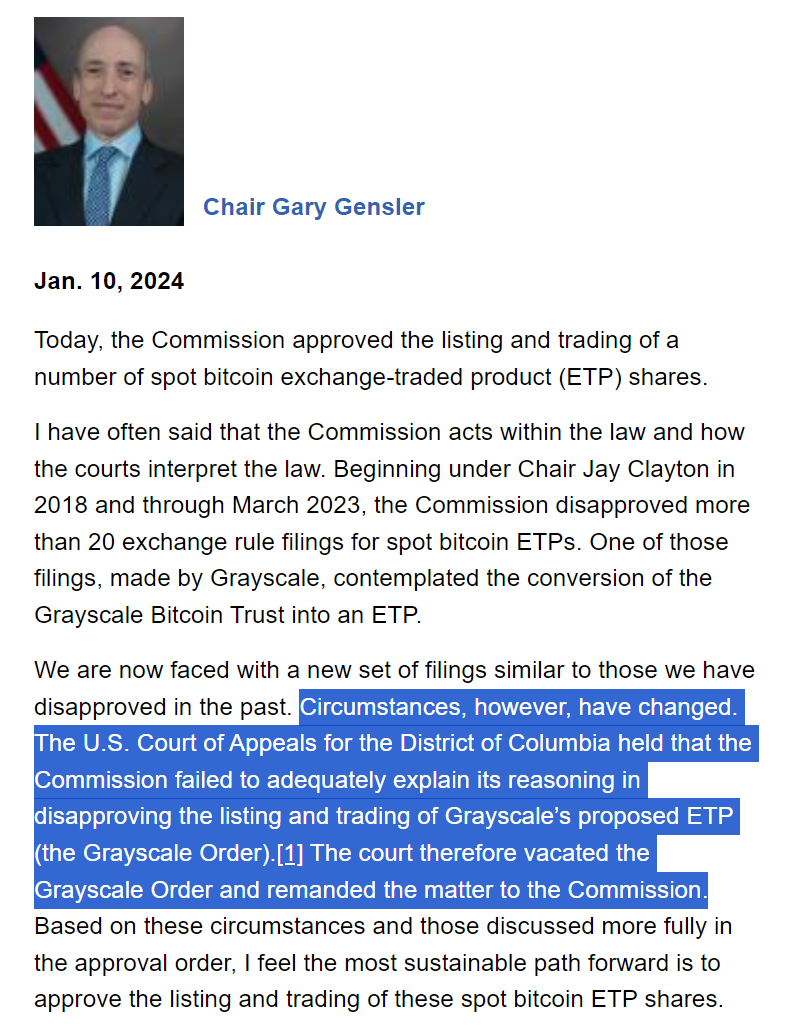Long Take: Will BlackRock, Fidelity, Bitwise or GBTC win the Bitcoin ETF launch?
GBTC is 5x more expensive than other products, sees major outflows
Gm Fintech Architects —
Today we are diving into the following topics:
Summary: In this article, we discuss the recent approval of 11 Bitcoin ETFs by the SEC, a decision influenced by judicial intervention rather than regulatory change. This reflects the growing acceptance of cryptocurrency, particularly among younger demographics who prefer crypto over traditional mutual funds. Bitcoin ETFs are significant as they integrate crypto into the traditional financial infrastructure, appealing to high-net-worth individuals and institutional investors. Despite their fees, these ETFs enable easier access to crypto assets. We also examine the various Bitcoin ETFs available, their fees, and the importance of tracking their performance relative to the underlying asset. The article concludes by highlighting the broader implications of Bitcoin's growing integration into mainstream finance, including its potential in scalable payment solutions and programmability.
Topics: SEC, FINRA, Bitcoin, BlackRock, Grayscale Bitcoin Trust (GBTC), BlackRock’s iShares Bitcoin Trust (IBIT), ARK 21Shares Bitcoin ETF (ARKB), Bitwise Bitcoin ETF (BITB), Invesco Galaxy Bitcoin ETF (BTCO), WisdomTree Bitcoin Fund (BTCW), VanEck Bitcoin Trust (HODL), Franklin Bitcoin ETF (EZBC), Fidelity Wise Origin Bitcoin Trust (FBTC), Valkyrie Bitcoin Fund (BRRR), Hashdex Bitcoin ETF (DEFI), Envestnet.
If you got value from this article, let us know your thoughts! And to recommend new topics and companies for coverage, leave a note below.
Long Take
Off to the Races
You already know that the SEC has approved 11 different Bitcoin ETFs last week.
It did not do so willingly. Rather, it was the Judiciary branch of the United States that checked the power of the Executive branch. Regulators are part of the Executive, whose role it is to enforce legislation created by Congress. Courts review the exceptional cases where someone is wronged, and clarify how to move forward and resolve conflict. It takes a pretty brave counterparty to contest the SEC and take them on in Court. Without the lawsuit, the regulator would not be balanced in its power. But the strategy has paid off, and clearly reasonable people can differ in their views.
This is not a change in the position of the regulator, per se, but a demonstration of the overall temperature about crypto in the world. Some things are simply inevitable, including technology and the changing of fashions. We present to you the following exhibit from a survey by FINRA:
The trends are plain on their face. Younger people are abandoning mutual funds for crypto, and leaving behind financial professionals and their banks for social media, apps, and financial influencers. Distribution of financial products is part and parcel of the attention economy, and we all buy things from the attention algorithms.
Crypto is the money of the Internet. Good luck fighting it and yelling at kids.
Even Larry Fink of BlackRock changed his mind, and embraced rock music.
But Why Though?
What is an ETF, and why does it matter so much to Bitcoin?
BTC has been available to mine, purchase, and trade through exchanges and various other methods for longer than a decade. Why do we need the ETF, which charges fees and layers on the financial participants that BTC is supposed to disintermediate?
The answer is that an ETF is a financial product wrapper that fits the current infrastructure of the capital markets and traditional financial distribution. If you are not yet yield-farming EigenLayer for points and tokens based on social media recommendations, you probably think of financial distribution as brokers, financial advisors, and institutional sales into funds, family offices, and endowments.
Just the HNW channel, shown below, holds $85 trillion of assets, of which 13% is in Alternatives. At 1% of total, Crypto would be $850MM of assets. At 5%, we are looking at $4 trillion. If you add in other wealth honey pots, the asset totals start ticking up into the hundreds of trillions.
So the BTC ETF is a packaging that plugs into massive traditional sales channels. It becomes part of an “asset allocation” and define a “crypto asset class” in the presentations of every single wealth manager in the world. Trading systems connected into the traditional stock exchanges can trade it, performance reporting systems like Envestnet can calculate performance, and money movement systems like ACATs can move it around.
Therefore, the ETF is all about financial adoption of the crypto asset class.
It is not about the technological adoption of blockchain-based financial or economic systems. That would be measured by comparing usage of digital assets against usage of the media Internet, as such.
Financial holding adoption is a different animal, so let’s not get confused. But, it unlocks an enormous brand benefit — just as being positively discussed by BlackRock is a large value add. There is, however, a difference between using the Google website for search, and buying Google stock.
We hope you see that.
For a deeper dive into how a BTC ETF integrates into asset management, see our previous take here.
So Far So Good
As mentioned before, we have 11 Bitcoin ETFs, and many more are likely coming. Other assets, like ETH, could see ETF wrappers in the years to come as well. Here is what has come to market, and their expense ratios.
Grayscale Bitcoin Trust — GBTC, 115 bps fee
(a conversion of everyone’s favorite closed-end trust)BlackRock’s iShares Bitcoin Trust — IBIT, 25 bps fee
ARK 21Shares Bitcoin ETF — ARKB, 21 bps fee









